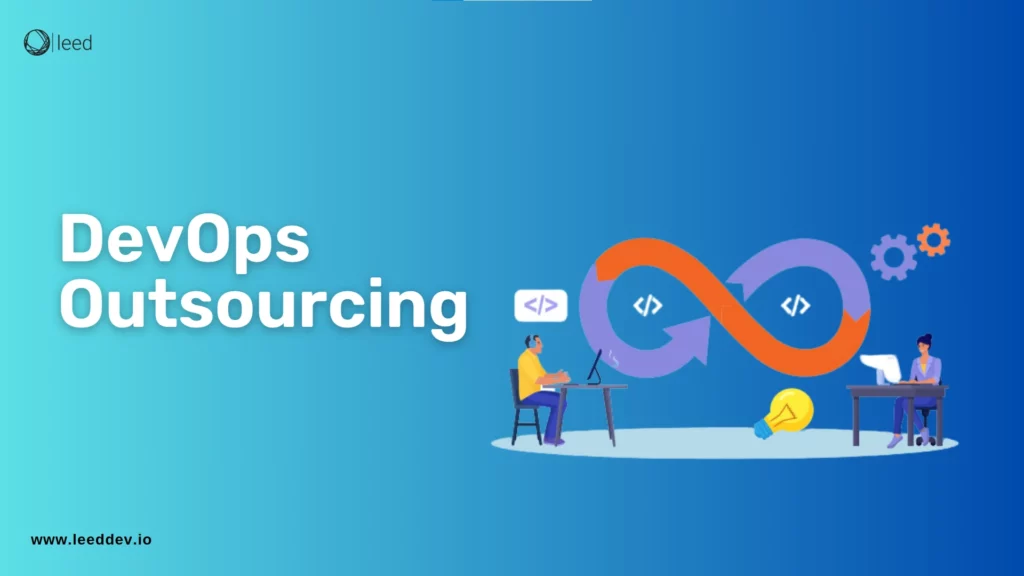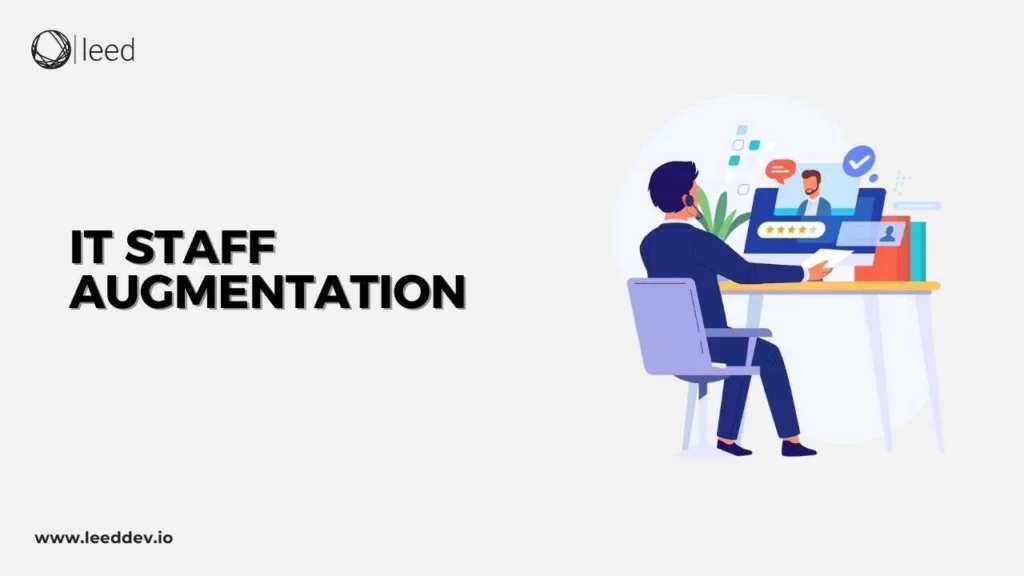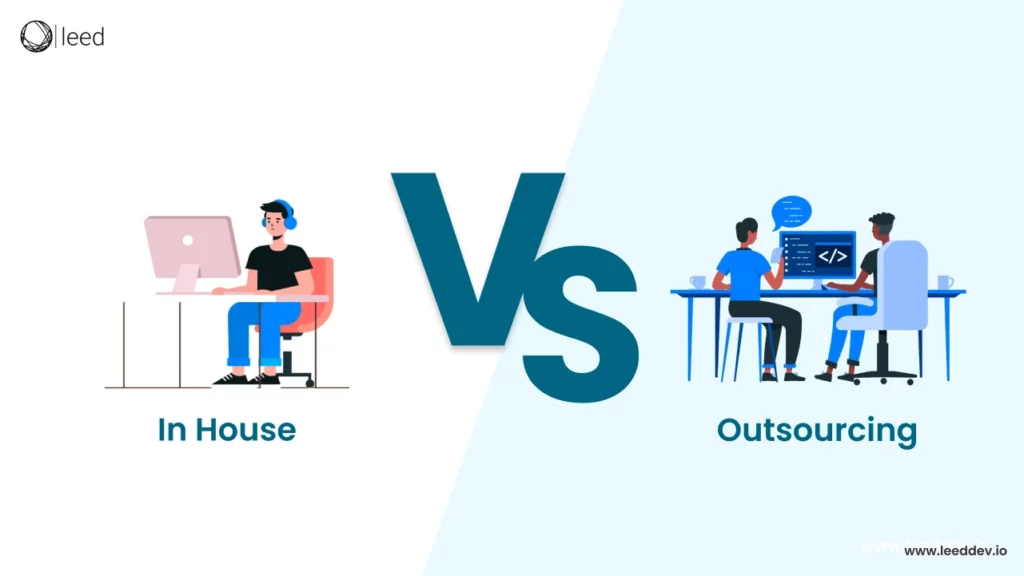According to a recent survey, 70% of respondents identified DevOps as a critical factor in achieving business goals. About 58% of companies struggle to find skilled DevOps professionals.
That’s where DevOps outsourcing comes in. Instead of spending hours on recruitment just find experts who can handle everything. Best part? Leed Software Development has got everything covered.
Ready to explore about DevOps outsourcing? It might just be the strategic move your company needs to drive growth in 2025.
What is DevOps Outsourcing?
DevOps outsourcing involves hiring external specialists to build and integrate DevOps solutions designed to your needs. These third-party experts work alongside your in-house software teams managing everything from continuous integration & continuous delivery to cloud migration & infrastructure maintenance.
Why Choose DevOps Outsourcing?
DevOps outsourcing is a practical way to improve efficiency, reduce costs, and speed up delivery. Here’s why outsourcing DevOps could benefit your business.
1. Access to Skilled Professionals
Outsourcing gives you access to experienced DevOps professionals. You avoid the time and cost of hiring and training an in-house team.
2. Focus on Your Core Business
With an outsourcing partner managing your DevOps tasks, your team can focus on strategic goals. This lets you prioritize innovation and growth without being bogged down by infrastructure management.
3. Tailored Solutions for Your Needs
DevOps providers create solutions that align with your specific business goals. These customized services ensure that each project is optimized for success.
4. Cost Savings
Outsourcing helps you save on hiring and maintaining a dedicated team. You also avoid the expenses of purchasing and maintaining advanced DevOps tools.
5. Flexibility and Scalability
Outsourcing allows you to scale your operations easily. You can increase resources during high-demand periods or scale down when they’re no longer needed.
6. Enhanced Security and Compliance
Reputable DevOps providers adhere to strict security measures. They also ensure compliance with industry standards like GDPR or HIPAA, keeping your data safe.
7. Faster Delivery Times
With expert handling and automated processes, outsourced DevOps teams speed up your delivery cycle. This means faster product launches and updates for your customers.
8. 24/7 Monitoring and Support
Outsourced teams provide round-the-clock monitoring and support. This minimizes downtime and ensures quick issue resolution.
9. Stay Updated with Latest Technology
DevOps outsourcing companies stay on top of the latest trends and tools. Your business benefits from cutting-edge solutions without needing to invest in regular upgrades.
10. Reduced Downtime
Outsourced DevOps teams focus on proactive system monitoring and maintenance. This ensures smoother operations and fewer disruptions.
Components of DevOps Outsourcing
DevOps outsourcing involves key components that help improve efficiency and software quality. Let’s take a look at the main components of DevOps outsourcing.
Infrastructure as Code (IaC)
Infrastructure as Code (IaC) is a core part of DevOps outsourcing. It means managing infrastructure through code instead of manual processes. This makes automation easier and ensures that infrastructure is consistent and reliable. Outsourced DevOps teams use IaC to set up, scale, and manage infrastructure smoothly.
Continuous Integration/Continuous Deployment (CI/CD)
CI/CD helps speed up software delivery. It allows code to be automatically tested and deployed, without manual intervention. Outsourced DevOps teams manage CI/CD pipelines to ensure faster, more reliable releases. This process reduces errors and ensures that high-quality software reaches production quickly.
Monitoring
Monitoring is key to keeping your systems running smoothly. DevOps teams use tools to track system performance in real-time. They can spot problems early and fix them before they cause issues. Continuous monitoring helps prevent downtime and ensures your services are always available to users.
Security
Security is built into the DevOps process. Outsourced teams add security measures at every stage of development. This includes vulnerability checks, data encryption, and compliance with regulations. By integrating security, they reduce risks and keep your system safe from cyber threats.
Cloud Migration
Cloud migration is another important part of DevOps outsourcing. Many businesses turn to outsourced teams to move their systems to the cloud. These teams optimize cloud resources for better performance and cost savings. Cloud migration also allows businesses to scale more easily and improve flexibility.
These components make DevOps outsourcing a powerful solution. By handling infrastructure, deployment, monitoring, security, and cloud migration, outsourced teams help businesses run more efficiently and deliver better software faster.
Key DevOps Stages for Continuous Delivery
DevOps is a set of stages that work together to ensure fast, high-quality software delivery. Here’s an overview of each stage:
Continuous Development
The first step in DevOps is planning and starting the project. Once the planning phase is complete, the team begins working on coding new features and fixing bugs. This step is all about starting the project and iterating on it.
Continuous Integration
Frequent code updates are integrated into the shared repository to ensure that the team is working with the latest version of the project. Each code update is tested automatically, which helps catch errors early in the process.
- Common CI tools: Jenkins, CircleCI, Travis CI.
This stage helps to keep the codebase stable and ensures that new features are integrated smoothly.
Continuous Testing
Automated testing is a key part of DevOps. In this stage, tests are run continuously to catch any errors early and ensure the software is always of high quality.
- Common testing tools: Selenium, TestSigma, Eggplant.
By testing continuously, the team can detect problems quickly, avoiding issues later in development.
Continuous Monitoring
In this stage, the system is constantly monitored to detect issues like server failures, slow performance, or low memory. Continuous monitoring ensures that problems are identified quickly and can be resolved before they impact users.
- Tools: Sensu, New Relic, Splunk.
This proactive approach minimizes downtime and ensures smooth operation of the software.
Continuous Feedback
Gathering user feedback is essential for improving the software.
- Feedback is collected through surveys and analytics to inform future development.
- Tools like Google Forms and Pendo help gather actionable insights from users.
- Continuous feedback ensures the software meets user expectations and business goals.
Continuous Deployment
Once code is tested, it’s deployed automatically to production environments. This is done through configuration management and containerization, making updates faster and easier to manage.
- Tools: Chef, Ansible, Docker.
By automating deployment, DevOps ensures that the latest code is always in production, reducing the risk of errors.
Continuous Operations
This stage is about minimizing downtime and maintaining high availability. Even during maintenance, DevOps ensures that the application remains operational.
- Tools: Docker, Kubernetes.
With continuous operations, the application remains up and running smoothly, providing a better experience for users.
These stages work together to streamline development and delivery, ensuring that software is high quality and delivered faster. Each stage builds on the previous one, creating an efficient and smooth process for both development and deployment.
How to Outsource DevOps Effectively with Minimal Risk in 2025?
Want to outsource DevOps with minimal risk? Then follow the given steps:
Define Your Goals and Scope
Clearly outline your DevOps goals, areas to outsource, and desired outcomes. Aligning expectations early ensures smoother collaboration.
Assess Vendor Expertise
Look for vendors with relevant skills, tools, and industry experience. Check their tech stack, project scale, client testimonials, and communication style to find the right fit.
Prioritize Security and Compliance
Ensure the vendor follows industry standard security and compliance practices like GDPR, HIPAA. Review their data protection policies and request compliance documentation.
Sign a Clear Contract
Define responsibilities and communication plans in a legally binding contract. Use a closed-scope contract for set terms, or an open-scope for flexibility.
Maximize Infrastructure as Code
Implement IaC to automate infrastructure setup, ensuring consistency, scalability and ease of management for new engineers.
Difference Between DevOps Outsourcing & In-house DevOps
To help you give a more brief overview go through the given table:
| Aspects | DevOps Outsourcing | In-house DevOps |
| Expertise | Access to specialized skills and tools | Dependent on hiring and training internal staff |
| Cost | Lower initial investment, pay-as-you-go | Higher costs due to salaries, training, and tools |
| Scalability | Easily scalable with flexible contracts | Limited by internal team size and capacity |
| Implementation Time | Faster setup with experienced vendors | Slower due to recruitment and training processes |
| Focus | Focus on core business tasks while experts manage DevOps | Requires dedicated time and resources |
| Control | Less control over day-to-day operations | Full control over processes and implementation |
| Customization | Custom solutions designed by the provider | Tailored to specific business needs internally |
| Risk Management | Shared with the outsourcing partner | Entirely managed by the internal team |
Pros & Cons of DevOps Outsourcing
Pros of DevOps Outsourcing
First of all, let’s discuss the pros of DevOps Outsourcing:
Focus on Core Business
Outsourcing DevOps lets you use expert talent without the burden of managing in-house team. You can concentrate on core business goals. DevOps specialists handle software delivery saving time and reducing costs in the long run.
Access to Top Talent
DevOps outsourcing provides access to a global talent pool including highly skilled and certified professionals often at a lower cost than building an in-house team.
Cost Efficiency
Skip the expensive hiring process, training costs, and operational expenses like office rent and software licenses. Outsourcing partners handle these aspects, reducing overall expenses.
Expertise
Outsourcing companies bring proven experience from various projects and ensure their teams are up-to-date with the latest technologies, delivering superior solutions.
Better Risk Management
Experienced DevOps engineers can anticipate potential issues and implement best practices to minimize risks, ensuring smooth operations.
Shorter Development Cycles
Collaborating with an outsourcing partner ensures more efficient development cycles through automation and expert consulting results in quicker time-to-market.
Flexible Pricing Models
DevOps Outsourcing services often offer flexible pricing making it more cost-effective compared to maintaining an in-house team.
Cons of DevOps Outsourcing
Cultural Shift Required
DevOps demands a shift to a product-centric model, focusing on collaboration and lifecycle management rather than traditional project-based work. This can be challenging in conservative environments with limited leadership experience.
Technical Knowledge Needed
To effectively work with a DevOps team, you need knowledge of CI/CD, infrastructure, and testing tools. Lack of technical expertise may hinder task-setting and monitoring.
Strong Teamwork Essential
DevOps relies on collaboration across diverse backgrounds, which can be challenging. Adopting DevOps gradually helps build strong teamwork.
Potential Communication Challenges
External DevOps teams may lead to communication gaps due to time zone or language differences.
Dependency on External Providers
Relying on an external provider can create dependencies, potentially affecting timelines if they face issues.
Data Security Risks
Sharing sensitive data with external teams requires strict security measures to mitigate risks.
Alignment with Company Culture
Ensuring an external DevOps team fits your culture is crucial for smooth collaboration and project success.
Leed Software Development as Your DevOps Outsourcing Partner!
If you are looking for one of the best DevOps Outsourcing companies then you are at the right place! At Leed Software Development we have got everything you are looking for! Gain immediate access to skilled DevOps engineers, customized to your infrastructure’s needs and at competitive rates. With our DevOps-focused team, expect shorter development cycles, faster recovery times and quicker releases. Our DevOps teams handle diverse projects, reducing risk and bringing best practices that minimize IT costs.
Why Choose Us?
✔ Fast Project Start: Start your project within 48 hours of finalizing the contract. Scale your team up or down within just two days to match your evolving needs.
✔ Expert DevOps Talent: Access top-tier developers with experience across startups, SMBs, and large enterprises. Our thorough recruitment ensures only the best talent for your project.
✔ Global Coverage, Local Fit: With a diverse talent pool, Leed Software Development provides experts who align with your time zone and work culture for seamless collaboration and transparency.
FAQs
What is DevOps outsourcing?
DevOps outsourcing involves hiring external experts to manage DevOps solutions designed to organization needs. Basically allows you to focus on core business tasks.
How does outsourcing DevOps improve efficiency?
Outsourced DevOps teams streamline processes through automation resulting in shorter development cycles and quicker time-to-market.
What should I consider when choosing a DevOps outsourcing partner?
Look for expertise, relevant industry experience, strong security practices & a good cultural fit with your organization. Leed Software Development is your best option!
What are the benefits of outsourcing DevOps?
Key benefits include:
✔ Access to specialized expertise
✔ Cost savings
✔ Faster implementation
✔ Customized solutions
✔ Improved risk management
What is Infrastructure as Code?
IaC is a key component of DevOps outsourcing where infrastructure configurations are managed programmatically enhancing consistency.
How do I ensure data security when outsourcing DevOps?
It’s crucial to work with vendors that follow industry standard security practices & to review their data protection policies to mitigate risks.
How quickly can I start my DevOps project with an outsourcing partner?
Many outsourcing companies like Leed Software Development can begin projects within 24-48 hours of finalizing contracts providing quick access to skilled talent.




